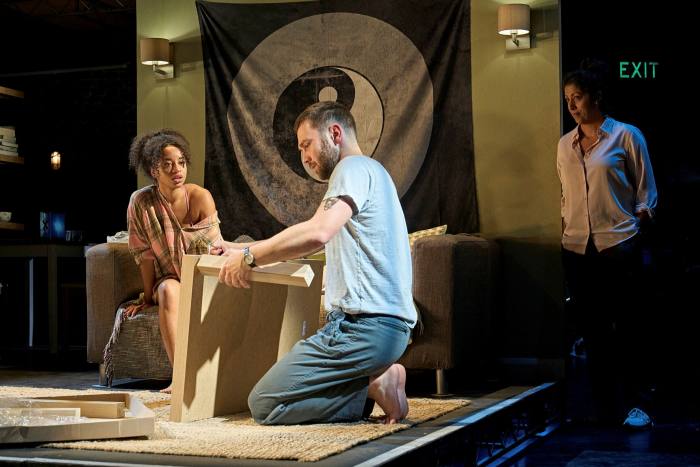Jitney
Old Vic, London

Three plays; three tight-knit groups of people banging up against the social barriers around them. In each one, sparks fly between the characters, but what really troubles them, whether they realise it or not, is the society that constrains them.
First stop, Pittsburgh, 1977 and a superbly acted revival of August Wilson’s Jitney (a co-production with Leeds Playhouse and Headlong Theatre Company). Set in an unlicensed cab office, it’s one of Wilson’s great American Century Cycle: 10 plays charting the experience of African American people across each decade of the 20th century.
Here it’s the 1970s and we’re talking flares, Afghan coats and gentrification. Alex Lowde’s set for Tinuke Craig’s staging is a simple boxlike shack, fitted up in orange, beige and tan, where the drivers take their ease on plastic chairs or warm their hands by the electric fire, until the shrill bell of the telephone summons them back out into the chill autumn air.
There’s banter and bluster — Wilson is so good at catching the rhythms of ordinary speech — but the playwright has soon sketched in the tensions that will drive the action. Here are Turnbo and Youngblood playing an aggressive game of checkers that foreshadows the violence that will erupt between them; here’s Fielding hustling for a four-dollar loan to feed his liquor problem; here’s Doub, eventually giving it to him just to keep the peace. Meanwhile, bigger problems snake towards them — the release of boss Becker’s son from prison; the imminent demolition of their station to make way for development.
This being the first of the plays Wilson wrote for his cycle, there are a few clunky gear changes that would bring a sharp reproach from the drivers’ exacting passengers. But he writes with a wealth of compassion for his characters and with honesty about male pride, vulnerability and obstinacy.
The men spring to life in Craig’s skilfully shaped staging. There’s particularly fine work from Solomon Israel as Youngblood, a young man trying to carve out a future on precarious earnings, from Sule Rimi as twitchy busybody Turnbo, Geoff Aymer as the quiet, calm Doub and above all from Wil Johnson as the tormented Bicker and Leemore Marrett Jr as his son Booster. Leanne Henlon holds her own as Youngblood’s exasperated girlfriend Rena.
The racism and inequality the men endure are woven into the texture of the play and into the very set-up (regular cabs won’t serve this district), but erupt into the open when we hear Booster’s back story. And there we hit Wilson’s real subject: the dignity of people trying to make a life for themselves in a society stacked against them. That modest box of a set gradually acquires another meaning.
★★★★☆
To July 9, oldvictheatre.com, then touring to Oldham, Worthing, Bath and Cambridge, headlong.co.uk
A Doll’s House, Part 2
Donmar Warehouse, London

To Norway next and another box — this time the bijou home of one Nora Helmer. Nora, as we know, slammed the door on that residence at the end of Ibsen’s groundbreaking 1879 play A Doll’s House. But what happened next? A Doll’s House, Part 2 is Lucas Hnath’s answer.
Hnath’s 2017 play begins with a firm knock at that same door. It’s 15 years later and Nora is back, sweeping in a rustle of silk and velvet in Noma Dumezweni’s magnificent performance. “You’ve got a little fatter,” observes the nanny Anne Marie who, played by the excellent June Watson, delivers truths like darts.
But her observation is astute. This Nora isn’t a woman who has, as so many imagined, run to destitution or depravity. Instead she has embraced her freedom and made a good living writing feminist books — until an unwelcome discovery about her marriage sends her back.
Over the next 90 minutes, Hnath extends and unpacks some of the arguments in Ibsen’s original, examining the real-life options for single women at the time, together with more universal uncomfortable truths about trying to forge your own path. Anne Marie reminds Nora that poverty drove her to leave her own child to care for Nora and her children: a move that enabled Nora’s choice. Nora’s daughter Emmy (Patricia Allison), meanwhile, is a confident young woman who wants to marry and is brightly indifferent to her mother and her mother’s views.
The setting may be 19th-century but the vernacular and some of the issues are much more contemporary, as Hnath’s characters pick their way through knotty questions about love, freedom, self-determination, class and social stigma. It’s delivered with brisk humour and pathos by the fine cast in James Macdonald’s production. Dumezweni’s Nora is imposing, grounded, prickly even, but tiny moments of taut silence reveal how just much she has endured; Brían F O’Byrne reveals vulnerability behind Torvald’s cold scorn. The play ends with the two talking as perhaps they should have done two decades earlier.
★★★★☆
To August 6, donmarwarehouse.com
That Is Not Who I Am
Royal Court, London

We come bang up to date with That Is Not Who I Am: so much so that the publicity surrounding the play has become a real-time extension of it. Announced by the Royal Court as a new play by an unknown writer — one Dave Davidson, said to have worked in the security services for 38 years — the play immediately sparked intrigue. Once the truth leaked that that was not who they were (spoiler below), a backlash followed, with many people angry that this was not, as advertised, a brave punt on an unknown author.
This rumbling backdrop raises ethical questions, but it also sets the scene for a piece about truth, misdirection, conspiracy theories and controlling the narrative. The play itself introduces another layer of opacity by claiming to be a true story smuggled in under all this subterfuge to defy a government ban on telling it.
What we get is a drama called Rapture, by award-winning writer Lucy Kirkwood, about a young couple (Celeste, a nurse, and Noah, a former soldier) who meet on a blind date, gradually retreat from society, become online activists and are then apparently murdered. Priyanga Burford, playing the playwright, reminds us that this is all a reconstruction of “real” events.
Moment by moment, it’s often gripping and unsettling. The two are very believable, brought to messy, warm, loveable life by the excellent Siena Kelly and Jake Davies in Lucy Morrison’s staging. Kirkwood vividly traces the recent journey we’ve all been on — the lockdowns, the fear, the isolation, the financial strains. We see how this combines with serious concern about powerful vested interests and online surveillance to drive the couple to radical action. Given the sinister manipulations of truth we’ve seen in public life, this is fascinating and all too topical material.
But for all that, it’s hampered by its own elusiveness. We never learn exactly what the couple were planning that was so shocking it had them silenced. In a world bristling with conspiracy theories, fake truths and online manipulation, which has seen a US president claim an election was stolen, that feels somehow woolly.
That might be the point of this slippery, wriggly drama: craving certainty is probably misplaced in a story that intentionally wrongfoots you and reveals truths through fictions. It’s disturbing, homing in on things we should surely have spotted already if we’d been paying attention over the past few years. But the structure prevents it from really interrogating them.
★★★☆☆
To July 16, royalcourttheatre.com
Stay connected with us on social media platform for instant update click here to join our Twitter, & Facebook
We are now on Telegram. Click here to join our channel (@TechiUpdate) and stay updated with the latest Technology headlines.
For all the latest Art-Culture News Click Here
